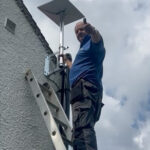
Why Cellphone Reception is Critical for the Industrial Sector
In today’s rapidly evolving industrial landscape, reliable cellphone reception has moved far beyond being a convenience—it’s now a vital pillar of operational success. From ensuring worker safety to supporting advanced digital tools, strong cellular connectivity plays a central role in keeping modern industry running efficiently and safely.
Real-Time Communication for Real-Time Decisions
Industrial operations often span large campuses, remote sites, and mobile teams. In such dynamic environments, immediate communication is essential. Whether it’s a machine failure on the production line or a logistics issue on the road, strong cellphone reception allows workers, supervisors, and executives to coordinate and respond instantly. This can drastically reduce downtime and streamline decision-making when every minute counts.
Powering the Industrial Internet of Things (IIoT)
IoT devices are transforming how industrial systems operate—monitoring performance, predicting maintenance needs, and automating routine processes. Many of these sensors and machines rely on cellular networks to transmit data in real time. Without strong, uninterrupted signal, the predictive power of IIoT systems is compromised, leaving facilities vulnerable to unexpected breakdowns and inefficiencies.
Enhancing Worker Safety
In high-risk environments such as manufacturing plants, construction zones, or mining operations, communication can mean the difference between a close call and a catastrophe. Workers in isolated or hazardous areas must be able to report emergencies or receive instructions instantly. Many safety systems, including lone worker monitoring and real-time environmental sensing, also rely on cellular networks to function properly.
Enabling Remote Monitoring and Operations
Cellular reception is key to supporting remote operations—a growing trend in the industrial sector. Whether it’s a technician diagnosing a machine from miles away or a manager overseeing multiple sites from a central dashboard, connectivity makes it possible. High-quality signal reduces the need for constant on-site presence, saving time and reducing operational costs.
Streamlining Logistics and Supply Chains
From coordinating deliveries to updating inventory systems on the go, logistics teams depend on cellular networks. Drivers, warehouse staff, and field teams need access to cloud-based tools and real-time updates. Poor reception can disrupt these workflows, leading to delays, errors, and customer dissatisfaction.
Supporting Mobile Workforce Tools
Industrial workers increasingly use mobile apps for timekeeping, maintenance logging, compliance reporting, and more. These tools eliminate paperwork and boost efficiency—but only if the devices they’re used on can stay connected. Reliable reception ensures these digital workflows stay uninterrupted.
Fueling Augmented Reality and Advanced Tech
Augmented reality (AR) tools are gaining traction in industrial environments, helping workers visualize equipment layouts, perform guided maintenance, or train with interactive overlays. These applications are data-intensive and require strong, low-latency connections to function properly—something only dependable cellular networks can provide.
Conclusion
Reliable cellphone reception isn’t a luxury for industrial operations—it’s a necessity. As digital transformation accelerates, companies must prioritize connectivity to maintain productivity, protect workers, and stay competitive. Investing in solutions like signal boosters, private 5G networks, or enhanced infrastructure ensures that industrial teams stay connected wherever the job takes them.




